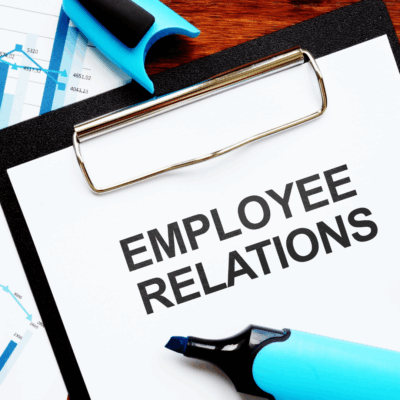Three of the Most Challenging and Complex Employee Relations Issues
Employee relations are all about creating a positive relationship between the employer and employees and fostering a positive work environment. When companies honor employees’ rights and expectations, employees are more satisfied, engaged, and productive—and employee relations issues are less likely to arise.
However, in the ever-evolving landscape of the modern workplace in which employee tastes, attitudes, and behaviors are also ever-evolving, employers sometimes get it wrong, and issues come up. This clash is playing out in real-time as we speak with the recent SAG-AFTRA strikes in which writers and actors are fighting for better pay, better working conditions, and contracts that prohibit the use of AI in production.
There are numerous challenges that can arise in the realm of employee relations. Among these, three issues stand out as particularly challenging and complex for HR professionals to solve: workplace discrimination, pay disputes, and performance management. Here’s why and some ideas for solving them.
Workplace Discrimination
Discrimination can manifest in various forms, be it unfair hiring practices based on race, uneven pay scales based on gender, limited access to career mobility based on sexual orientation, or other unfair treatment based on personal attributes.
Such practices are difficult to address because they often involve ingrained biases and systemic problems and can bring up compliance issues for employers, resulting in hefty legal fines. Moreover, victims might hesitate to come forward due to fear of retaliation (since retaliation discrimination is the most frequently cited form of employment discrimination, followed closely by race discrimination).
To prevent workplace discrimination disputes and bolster employee relations to create a positive work environment, companies must create a zero-tolerance policy towards discrimination and harassment, including regular training sessions, clear reporting mechanisms, and by ensuring that complaints are addressed promptly and fairly.
Pay Disputes
Employee relations can falter when there is a disagreement between the employer and the employee around compensation. Often, these disputes occur over unpaid wages, discrepancies in salaries, or disagreements about bonuses and benefits.
Resolving pay disputes is intricate work because it touches on the fundamental reason people work: remuneration (or the fair exchange of work for pay). Such disputes can lead to decreased morale, reduced productivity, turnover, negative hits to company reputation, and even legal challenges. In fact, pay disputes are the single most common cause of worker strikes.
Employers should strive for transparency in compensation structures and regularly benchmark salaries against industry standards to stay in the clear when it comes to pay disputes. Open communication channels where employees can voice their concerns about pay without fear of retribution can also help foster strong employee relations around pay.
Workplace Safety
Promoting safety in the workplace should be a top priority of every employer, regardless of what industry they operate in. Workplace safety pertains to the measures and protocols in place that ensure that employees can perform their duties without risk of physical or psychological harm.
Creating safer working environments helps employers prevent accidents, which results in fewer occupational health costs, better employee retention and satisfaction, less employee downtime, and less retraining time. Plus, unsafe working conditions can result in costly multi-million dollar lawsuits.
But ensuring safety is multifaceted and growing in complexity. It now not only encompasses the obvious physical hazards, like machinery and chemicals, but it also includes psychological threats, like bullying or excessive stress—the latter of which is becoming increasingly a threat to businesses with the rise of burnout. The challenge is heightened in industries like construction or manufacturing, where the risk of accidents is higher.
To prioritize workplace safety and keep employee relations intact, companies should conduct regular risk assessments, provide necessary training, and ensure that safety protocols are regularly updated and adhered to. And, like the employee relations issues listed above, organizations must foster a culture where employees feel empowered to report safety concerns.
For more insights into how to manage employee relations to create a positive work environment and limit workplace disputes, listen to this week’s episode of America Back to Work: Expert Interview Series wherever you get your podcasts.
We’re sitting down with Amanda Haddaway, an award-winning HR consultant specializing in conducting workplace investigations, solving complex employee relations issues, leading interactive and engaging training sessions, and advising small business owners and leaders.
Click here to listen and get her take on how to manage mission-critical issues with people that may seem too sensitive or big to handle.







